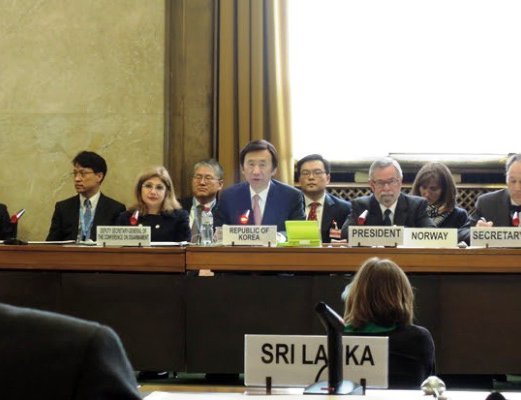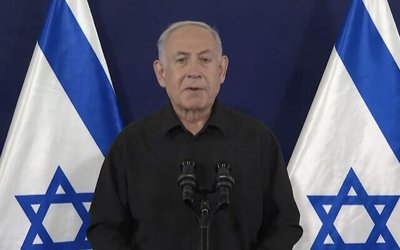
By Yun Byung-se South Korean Minister of Foreign Affairs
As I stand here in this august chamber of the Conference on Disarmament (CD), it feels like a homecoming after a 16 year-long journey. But it is a quite mixed feeling. Why?
On the one hand, like the serene landscape of Geneva, time seems to have stopped here while there has been a sea change in the world, for better or worse.
On the other hand, this chamber has not lost its charm and potential to relive the good old days of brisk arms control diplomacy here in Geneva, day and night.
Since Korea marks its 20thanniversary as a member of the Conference, and the CD stands at a critical juncture, I have come here with a serious and clear message: We support UN Secretary-General Ban Ki-moon’s and CD Secretary-General Moeller’s efforts for revitalizing the CD, and as a member of the P6, we stand ready to contribute to this end.
Over the past four decades, the CD has made manifold contributions in the field of disarmament and arms control. In particular, many of us cherish a fond memory of the mid-1990s when this body was in full gear and crafted groundbreaking, landmark agreements on WMDs, including the CWC and the CTBT.
For this reason, we all know the CD can play a catalytic role in furthering disarmament and arms control, thereby improving the international security landscape.
Unfortunately however, since 1998, the CD has lost steam. Indeed, at the time I left my posting in Geneva in 2002, it was beyond imagination that almost 15 years later, the Conference would still have failed to even adopt its program of work. This abnormal state of affairs, or the new normal of the CD emanating from its inaction, is incurring considerable costs.
In particular, the paralysis in the CD is sending out the wrong message on the global non- proliferation regime centered on the NPT. In 2011, at the CD, UN Secretary-General Ban Ki-moon warned that, and I quote, “the continued deadlock has ominous implications for international security. The longer it persists, the graver the nuclear threat – from existing arsenals, from the proliferation of such weapons, and from their possible acquisition by terrorists,” unquote.
And unfortunately, we are witnessing that his warnings on the nuclear threat are materializing not from the outside, but from within the CD – because of the DPRK, a member of this Conference. Indeed, North Korea has an unmatched notorious track record.
(1) It is the first country which has conducted nuclear tests in this century; it has conducted four nuclear tests and launched six long-range missiles in the last ten years, in violation of UN Security Council resolutions and international norms;
(2) It is the first country which has developed nuclear weapons programs within the NPT regime and announced its withdrawal from both the IAEA and the NPT;
(3)It is the first country which has officially declared itself as a “nuclear-armed state” in its constitution; and
(4) It is also the first CD member state which declared itself as “the youngest nuclear weapons state,” at this very Conference last year and threatened the “final destruction”of another CD member state, the Republic of Korea, here in this august chamber right after its third nuclear test in February 2013.
As can be seen from the above, Pyongyang is like a serial offender. It is no wonder that the Security Council will very soon adopt a landmark resolution with the strongest ever non-military sanction measures in seven decades of UN history. This is a clear manifestation of the resolve of the international community to punish North Korea’s provocations once and for all. It is also no wonder that some member states raised the issue of the DPRK’s qualifications as a peace-loving UN member state, both at the Security Council and General Assembly meetings, in view of its persistent provocations and non-compliance.
On top of all this, North Korea has defied and is even now defying UN sanctions and international condemnations by declaring it will continue long-range missile launches. Last week, Pyongyang even stated in public that it will strike the Republic of Korea, as well as the U.S., to take revenge in stunning and unimaginable ways.
The key message I wish to deliver is not just about North Korea, but about its implications on the CD, global non-proliferation and the international community as a whole.
First, for the sake of the integrity and credibility of the NPT regime, we should make urgent efforts to stop and roll back North Korea’s nuclear and missile capabilities in accordance with existing and new UN Security Council resolutions. Even at this moment, Pyongyang is accelerating its nuclear weapons and missile capabilities, from nuclear bombs and hydrogen bombs to ICBMs and SLBMs. We have heard Pyongyang officially state its intention not only to further develop its nuclear weapons and missiles, but also to use them.
As one defense minister of a CD member state in the southern hemisphere recently remarked, no country in the world is now free from North Korea’s nuclear and missile blackmail. Indeed, we are living under Pyongyang’s nuclear sword of Damocles, dangling right above our heads.
Second, we must strengthen the rule of law in the global non-proliferation and disarmament regime, particularly through ensuring universality and compliance.
In this regard, North Korea’s nuclear tests are a direct challenge to the CTBT, one of the most significant achievements of the CD. So, I hope that later in June, at the ministerial meeting to be held in the 20th anniversary of the Treaty’s adoption, North Korea will be on the top of the agenda.
Another important means to strengthen the rule of law in disarmament and non-proliferation is to start FMCT negotiations without further delay. In this regard, the latest proposal for a flexible mandate is worth favorable consideration. Even at this moment, Pyongyang is producing and stockpiling nuclear materials out of the reach of IAEA safeguards. In my view, the FMCT could address such pressing issues, as well as other related aspects of fissile materials.
Also, it is crucial that the new Security Council resolution on North Korea, be implemented without delay, without exception and without condition so that we will be able to achieve the complete, verifiable and irreversible denuclearization of North Korea.
Third, individual countries should be encouraged to take various and practical steps to work towards our common vision of Global Zero, a world free of nuclear weapons.
During the previous Nuclear Security Summit in March 2014, my President spelled out the vision of a nuclear-weapons free Korean Peninsula. Since that time, my government has been active in regional and global forums to turn the dreams of a nuclear-weapons free world into a reality.
Just before my speech, we heard from the representative of Kazakhstan. Twenty-five years ago, in 1991, the then newly independent Kazakhstan permanently closed the Semipalatinsk Test Site, previously a major site for nuclear weapons testing. Now, Kazakhstan is a good model of non- proliferation, and a rapidly rising economy in its part of the world. This success story is in stark contrast to what is happening in North Korea.
Indeed, North Korea’s nuclear weapons and missile programs are the greatest threats to peace and security in my part of the world. If we are unable to stop Pyongyang’s continued pursuit of a nuclear arsenal, it will fuel vicious cycle of a regional arms race in an already heavily armed region.
We are currently living in turbulent times, witnessing the eruption of multiple geopolitical tensions and global challenges. In other words, we face an over-supply of problems and a deficit of solutions.
Amid these challenges, the CD has an important role to play in promoting international security by fulfilling its mandate of disarmament and arms control. If the impasse in the Conference goes on, it will incur a high cost, going beyond the field of disarmament, especially when the three pillars of the UN – peace and security, development and human rights – should reinforce each other more than ever before.
Even though your mandate is to disarm, let me ask you to arm yourselves with a spirit of flexibility and compromise to revitalize this Conference. I truly hope that this Conference will summon the wisdom and initiative to break the deadlock and open new ground
Key Note Statement Delivered by South Korean Foreign Minister At UN Conference on Disarmament
- TANAHU HYDROPOWER PROEJCT: A Significant Achievement
- Apr 15, 2024
- AMBASSADOR HANAN GODAR: Sharing Pain With A Nepali Family
- Mar 30, 2024
- VISIT OF KfW AND EIB TO NEPAL : Mission Matters
- Mar 25, 2024
- NEPAL BRITAIN SOCIETY: Pratima Pande's Leadership
- Mar 24, 2024
- NEPAL ARMY DAY: Time To Recall Glory
- Mar 15, 2024
















